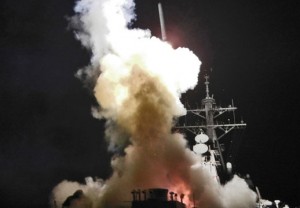
The Libyan uprising has entered its fifth week. Apart from the current no fly zone imposed by the UN security Council,the UN has also imposed tough measures against the Libyan regime including asset freeze,travel ban,arms embargo and a referral of the situation in Libya to the International Court of Justice.
Two days after the international coalition has launched a military strike against Gaddafi forces in what is being called operation “Odyssey Dawn”,Gadaffi vows to defeat any foreigners interfering even as himself attacks the Libyan people with artillery. In a speech on Sunday,his second since the air raids began and during which he never appeared on screen,Gaddafi promised to a “long war”.
But now comes the hard part. As the world is monitoring closely the upshots of the UNSC’s fly zone in order to stop the deviances of the fierce dictator,western military planners conduct battle-damage assessments and launch further strikes after unleashing more than 130 cruise missiles and waves of air strikes,analysts cautioned against expecting an easy or fast result. How successful can this military action be?
As Aljazeera points out,air power is overrated,as the US learned rather painfully in Afghanistan and Iraq. Meanwhile,taking steps imposing a no-fly zone put the coalition at a divergence with the Arab League,though the Arab League made itself no move to impose it. “This is the beginning of the war;Gaddafi’s primary capabilities are conventional armour and particularly artillery. Destroying his air force will not by itself win the war,” head of STRAFOR George Friedman told Reuters,“The war in on the ground.
Gaddafi’s main avenue of attacks is via artillery and ground forces. First strikes halted the advance of Gaddafi’s forces on Benghazi and targeted Libyan air defences to give western warplanes control of the strikes,but there have been no gains on the ground. As the operation continues and becomes for complex,there is a high risk that western forces could cause casualties among the civilians they have “promised” to protect. A similar case has been the imposition of a no-fly zone on Iraq which did little to overthrow Saddam Hussein regime,but it surely resulted in the deaths of thousands of civilians.
On the other hand,the recently formed opposition council based out of Benghazi — the same group that is leading the calls from eastern Libya for foreign airstrikes against Gaddafi’s air force — has explicitly warned against any military intervention involving troops on the ground. “The committee rejects foreign troops on the ground but we encourage the aerial bombardment of Gaddafi’s arms,” Ahmed El Hasi a spokesman for the 17 February Opposition Coalition said in Benghazi.
On the ground and at sea,Gaddafi’s better trained,paid and armed troops gain ground. They maintain control of the west and much of the center of the country,and from their frontline at Ajdabiya,the gateway to Benghazi,continue to cast a shadow over the rebel’s eastern holdings and the southern huge oil regions. For their part,the rebels,are hoping of a more even fight,might use the reduced threat of aerial bombardment to multiply their efforts to march on Tripoli. Far from ending the conflict,the no-fly zone might extend the ground war amongst the oil installations and along packed down desert lines.
With or without foreign intervention,Libya’s faith remains unpredictable.
Επιμέλεια:J.J.